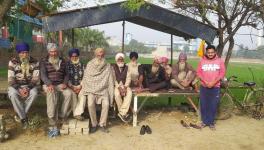Ram Rahim’s Conviction Sets Ablaze North India, Police Mismanagement Not the Only One to Blame
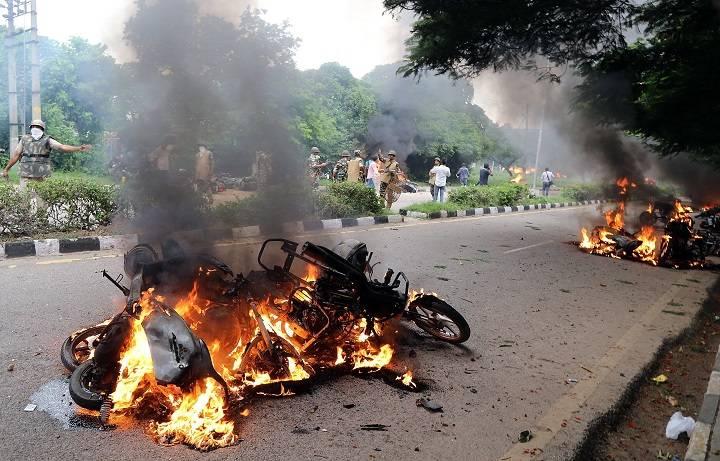
Thick smoke billowed high into the sky as terrified local residents of Panchkula locked themselves inside their homes. The scenes outside had shaken even the toughest of the tough to their bone.
The afternoon of August 25 saw a trail of death and destruction in Panchkula, Haryana, as soon as Baba Gurmeet Ram Rahim Singh was convicted by a special CBI court in a rape case. Thousands of followers of Ram Rahim, who had gathered in Panchkula over the past four days, went on a rampage, hurling stones, vandalising media vehicles and setting afire several vehicles. As many as 28 deaths were reported from Panchkula while three deaths were reported from Sirsa. A steady stream of ambulances was bringing scores of injured people to the local civil hospital. Around 200 were reported injured. DCP Panchkula was suspended for negligence in the imposition of Section 144.
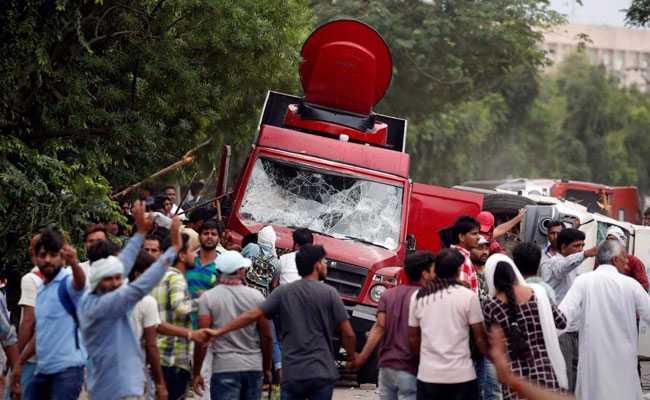
Gurmeet Ram Rahim Singh, an Indian spiritual leader, has been the head of the spiritual group Dera Sacha Sauda (DSS) since September 23, 1990. The Baba has about fifty million devotees. In 2002, a female follower of Singh's allegedly penned an anonymous letter to the then Prime Minister of India Atal Vajpayee accusing Singh of sexual abuse. A CBI probe was ordered into the incident on September 24, 2002, on the intervention of Haryana and Punjab High Court. The special CBI court has now found Singh guilty of two counts of rape.
In the same year, Singh had murder charges levelled against him for the alleged murder of journalist Ram Chander Chhatrapati, who was writing articles at the time about Dera Sacha Sauda, and for the murder of Dera Sacha Sauda manager Ranjit Singh. Chhatrapati had published an anonymous letter that gave details about how women were sexually assaulted by Gurmeet Ram Rahim at Sirsa ashram. Months after, he was shot from point-blank range right outside his house on October 24, 2002.
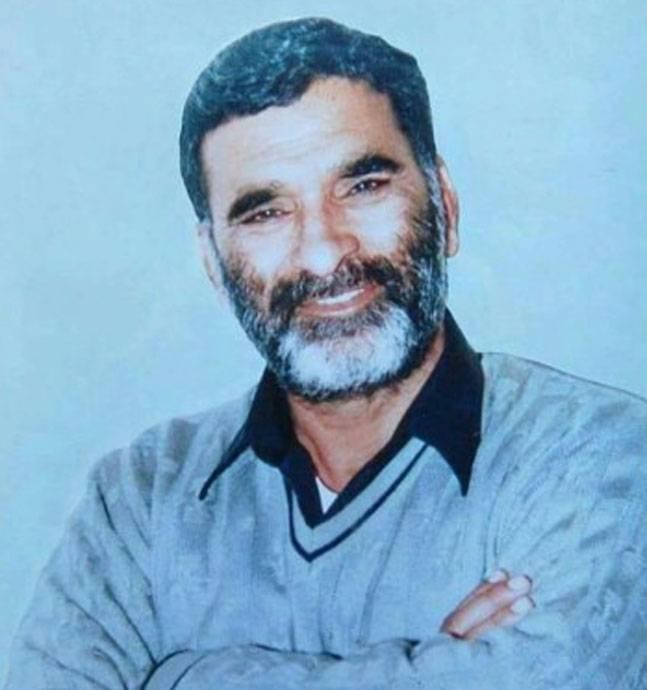
In 2007, when the UPA was in power, the Dera supported the Congress in the Punjab assembly election. But in 2014, Rahim endorsed the Bharatiya Janata Party for both the general election and the Haryana state election. 44 candidates were shepherded to the Dera by Kailash Vijayvargiya, who was then in charge of BJP in Haryana, to seek Baba’s blessings. Their wish was granted and Singh tweeted a picture of himself voting as the Dera let it be known that devotees should back PM Modi's party. Cleanliness drives organized by his sect featured political VVIPS, including Chief Minister ML Khattar.
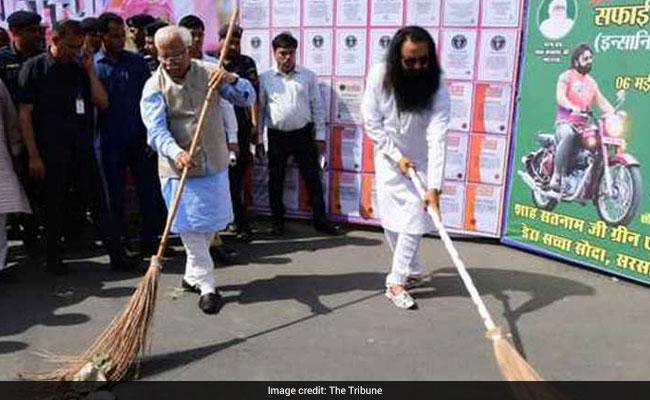
Earlier this year, he also extended support to the BJP-Akali Dal government in Punjab, which was defeated in the election by Captain Amarinder Singh of the Congress.
At least three senior state ministers in the BJP government in Haryana — Ram Bilas Sharma, Anil Vij and Grover — have together gifted Dera Sacha Sauda leader Rs 1.12 crore.
The state education minister, Ram Bilas Sharma, who publicly defended Singh’s followers, had made a public spectacle by gifting him a cheque of Rs 51 lakh recently.
Talking to the press on Friday, Sharma called DSS followers “simple, peace loving people,” who may have gathered in Panchkula in huge numbers “but till now have not touched a single plant”. The minister, who defended the sect on the day when it caused large-scale violence, was a guest at DSS headquarters in Sirsa on August 15 to celebrate the sect chief’s birthday.
The questions that now arise are, why is there so much violence in Chandigarh, Punjab, Haryana, Delhi over the conviction of a criminal. What makes his following so large and his followers so devoted that they would go to any lengths to ‘save’ their Baba?
We need to look into the kinds of Deras [spiritual cult and non-profit social welfare and spiritual organisation] that exist and in particular, Singh’s Dera Sacha Sauda.
According to a study conducted by the Desh Sewak, a Punjabi daily published from Chandigarh, there are more than 9,000 Sikh as well as non-Sikh Deras in the 12,000 villages of Punjab. In Sikh Deras, Sikh Rahit (code of conduct) is observed strictly. Whereas in the non-Sikh Deras, different ritual practices are followed. The Radha Soamis, Sacha Sauda, Nirankaris, Namdharis, Divya Jyoti Sansthan, Bhaniarawala and Ravidasis are among the most popular non-Sikh Deras.
The composition of these Deras is along caste lines. Though the majority of the followings in every case comes from Dalits, backward castes and poor Jat Sikh peasantry, the command is entrusted in the hands of the upper castes. Among them, the chief of the Nirankari Deras belonged to the Khatri caste, and that of the Sacha Sauda and Radha Soamis come from the Jat Sikhs of the Sidhu and Dhillon sub-castes respectively.
Many Dalits in Punjab have improved their economic conditions by dissociating themselves from their caste occupations as well as distancing themselves from agriculture [Jodhka 2004]. They have strengthened their economic position through sheer hard work, enterprise, and ventures abroad. Some of them have also established their own small-scale servicing units, and work as carpenters, barbers, blacksmiths, masons and so on. In addition, they have also been politicised to a large extent by the socio-political activities of the famous Ad Dharm movement, and the various Ravidass Deras. Thus, they have not only improved their economic status but have also liberated themselves from the subordination of the Jat landowners.
With an improved economic position and a sharpened sense of social consciousness, Dalits in Punjab started demanding a concomitant rise in their social status, that has also probably pushed them closer to the alternate religious bodies promising dignity and social equality.
Caste might be one of the reasons, but it is not reason enough for the devotees to be such staunch followers. The activities carried out by the Dera; social work against the menace of alcohol and drugs in the region has attracted a large number of women and men into the fold of Sacha Sauda. It has managed to improve and transform the quality of their lives. Addiction to alcohol and drugs has been a rising problem throughout the areas near border including Sirsa, Sriganganagar and parts of Punjab.
The reason for the violence is a result of the failure of the administration. The supporters of Dera had started gathering in Panchkula 4 days before the verdict came out. In spite of the imposition of Section 144, the administration silently watched as thousands of followers piled up. And hence allowed the situation to build up to the kind of violence that took place.
Disclaimer: The views expressed here are the author's personal views, and do not necessarily represent the views of Newsclick.
Get the latest reports & analysis with people's perspective on Protests, movements & deep analytical videos, discussions of the current affairs in your Telegram app. Subscribe to NewsClick's Telegram channel & get Real-Time updates on stories, as they get published on our website.















